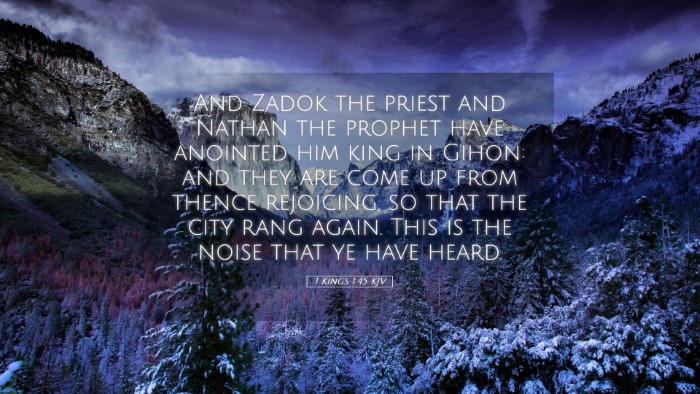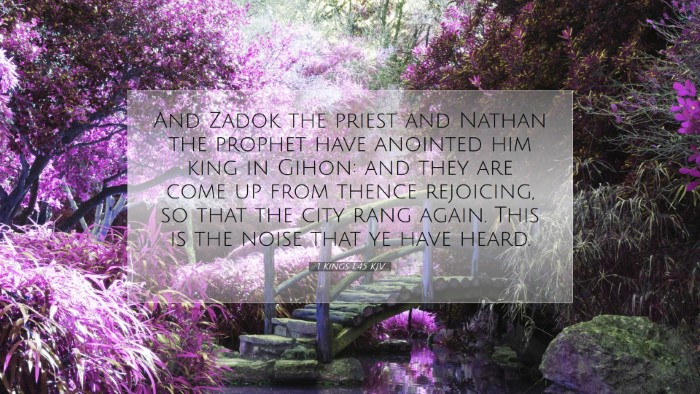Commentary on 1 Kings 1:45
Text of 1 Kings 1:45 (KJV): "And Zadok the priest, and Nathan the prophet, have anointed him king in Gihon: and they are come up from thence rejoicing, so that the city rang again. This is the noise that ye have heard."
Introduction
The narrative surrounding 1 Kings 1:45 marks a pivotal moment in the history of Israel, emphasizing the themes of divine selection, leadership, and the significance of prophetic authority. As we explore this verse and its context, we draw upon the insights of esteemed public domain commentators such as Matthew Henry, Albert Barnes, and Adam Clarke.
Historical Context
This verse occurs in the broader context of Adonijah's attempt to usurp the throne of David. The political landscape is fraught with intrigue as David's weaknesses become apparent. The events at Gihon highlight the ceremonial and divine endorsement of Solomon as the rightful king, countering Adonijah's ambitions.
Key Figures
- Zadok the Priest: Zadok's role as high priest underscores the importance of spiritual authority in the installation of kingship. His anointing of Solomon serves to legitimize the new king before God and the people.
- Nathan the Prophet: Nathan's involvement illustrates the prophetic endorsement that accompanies God's chosen leadership. His presence signifies the importance of divine revelation in guiding Israel’s political decisions.
The Anointing of Solomon
The anointing of Solomon by Zadok and Nathan speaks to the traditions of Israel’s monarchy. It serves as a powerful reminder that although human authority may waver, God’s plans and purposes prevail through His chosen instruments.
Matthew Henry comments on the act of anointing as a divine appointment, noting that “It is God who raises up and puts down kings.” This divine sovereignty is foundational in understanding the legitimacy of Solomon’s reign.
The Significance of Gihon
Gihon, as the site of Solomon’s anointing, carries rich theological implications. Water plays a vital role, symbolizing purity and the presence of God. The act of anointing at a spring reflects the life-giving aspects of God’s anointing, preparing Solomon to lead with wisdom and strength.
Albert Barnes elaborates on Gihon’s geographical and symbolic significance, suggesting that “the choice of this site reveals the contrast between the festivity of God’s ordination and the somber gravity of Adonijah's usurpation.”
Joy and Celebration
The joyous reaction of the people following Solomon’s anointing illustrates the enthusiasm for God’s chosen leader. The phrase “the city rang again” signifies not merely noise, but the sound of hope, renewal, and divine affirmation for the future of Israel.
Adam Clarke emphasizes this celebratory aspect, interpreting it as an expression of communal joy that stands in stark contrast to Adonijah’s conspiracy, which was characterized by secrecy and fear.
Divine Intervention and Sovereignty
This anointing scene vividly depicts the interplay between divine sovereignty and human agency. While Adonijah may scheme, it is ultimately God’s plan that prevails. The chorus of the people’s delight reflects their recognition of God’s hand in establishing Solomon's reign.
Henry points out that “the church should always rejoice in the divine choice of leaders, for their appointment is a sign of God’s favor and providence.” The affirmation of Solomon’s kingship reaffirms the covenant God made with David and his descendants.
Insights for Reflection
As pastors, theologians, and students of Scripture, this passage invites reflection on several critical themes:
- The Role of Leaders: What divine characteristics should leaders exhibit, and how can churches recognize and respond to God’s anointed leaders today?
- Community Celebration: How can congregations engage in joyful affirmations of God’s work in their midst, particularly during times of transition and uncertainty?
- Faith amidst Conspiracy: How do we discern God’s leading when faced with opposition or competing claims to authority?
Conclusion
1 Kings 1:45 encapsulates a moment of divine triumph over human ambition, reflecting the sovereignty of God in the establishment of leadership. The anointing of Solomon, backed by the priestly and prophetic authority, serves as an enduring reminder for future generations of believers to trust in God's plan and rejoice in His providence. The insights drawn from esteemed commentators like Henry, Barnes, and Clarke encourage us to uphold the dignity of God’s choice in leadership and to celebrate His faithfulness in guiding His people through appointed leaders.


